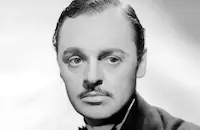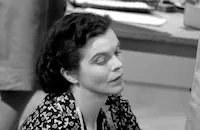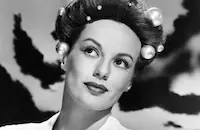Affectionately Yours

Brief Synopsis
Cast & Crew
Lloyd Bacon
Merle Oberon
Dennis Morgan
Rita Hayworth
Ralph Bellamy
George Tobias
Film Details
Technical Specs

Synopsis
Despite the fact that he has a wife back in the United States, Lisbon-based reporter Richard "Rickey" Mayberry flirts with every attractive woman, especially fellow reporter Irene Malcolm. In fact, as Rickey says, he would propose, but his wife refuses to divorce him. When he receives a telegram announcing that his wife Sue has divorced him, however, Rickey is so upset that he sneaks onboard the next airplane heading for New York. Irene is also on board. Because Rickey has led Sue to believe that he was hurt in a street fight, she meets the airplane with an ambulance. When she learns that he only sprained his ankle while trying to sneak onto the airplane, she kicks him, causing him to hit his head on the roof of the ambulance. Now that he actually is injured, Sue takes him home. Discovering that Sue got the divorce because he is always out of town, Rickey fakes a call to Chester Phillips, his boss, but as he loudly demands a local assignment, the telephone rings, revealing his ruse. Sadly, Sue announces that she will go through with her plans to marry inventor Owen Wright. This time, Rickey really does ask Phillips to let him work in the United States, but Phillips refuses and fires him. After Rickey leaves, Phillips tells Irene that Ricky's wife has divorced him, and he is determined to keep them apart in order to keep Rickey, his best reporter, in Europe. With this in mind, when Sue phones Phillips to confirm Rickey's dismissal, Phillips denies everything. In order to prevent her marriage to Owen, Rickey kidnaps Sue and drives with her to the country, hoping to convince her to change her mind. Although she still loves Rickey, Sue will not return to him. Meanwhile, Phillips steals a photograph of Rickey embracing Irene from Rickey's photographer Pasha. Irene also plots to separate Rickey from Sue. She suggests that Rickey pretend to accept Sue's marriage plans and ask her to call an escort service to find him a date. When Sue does this, Irene responds. She flirts outrageously with both Rickey and Owen, making Sue jealous. Then Irene "accidentally" drops the picture of Rickey kissing her. Rickey tries to cover it up, but Sue is furious. Later, Irene apologizes and lures Rickey to her apartment where Phillips has hired some men to keep him locked up until after Sue's wedding. After seeing a piece of paper twisted in Phillips' characteristic manner, Rickey realizes that Phillips is behind the entire episode, sets off the fire sprinklers and then escapes in the confusion. Rickey asks Pasha to call Sue, pretending that Rickey is injured. When she hears this, Sue runs away from her wedding to meet him at the hospital. There, Rickey promises never to leave her and the two are reconciled.

Director

Lloyd Bacon
Cast

Merle Oberon

Dennis Morgan

Rita Hayworth

Ralph Bellamy

George Tobias

James Gleason

Hattie Mcdaniel

Jerome Cowan
Renie Riano
Frank Wilcox

Grace Stafford
Carmen Morales
Murray Alper
William Haade
Pat Flaherty

James Flavin

Butterfly Mcqueen

George Meeker
Antonio Filauri
Irene Colman
De Wolfe Hopper
Frank Faylen
Garrett Craig

Craig Stevens

Keith Douglas
Nat Carr
Fred Graham
Garry Owen
Ed Brian
Ann Edmonds
Charles Marsh
Billy Wayne
Wedgwood Nowell
Peggy Diggins

Alexis Smith
Ed Gargan

Dorothy Adams
Henry Blair

Charles Drake

Faye Emerson
Mary Field

Juanita Stark
Crew
Leo F. Forbstein
Fanya Foss
Robert Foulk
Tony Gaudio
Anton Grot
Ray Heindorf
Mark Hellinger
Edward Kaufman
Matty King
Aleen Leslie
Owen Marks
Dick Mayberry
Orry-kelly
C. A. Riggs
H. Roemheld
Perc Westmore

Film Details
Technical Specs

Articles
Affectionately Yours
The problems with Affectionately Yours were twofold. First, it was a comedy personally chosen by studio head Jack Warner. A wannabe comedian, Warner would have been a leading contender in any contest to name the most comically challenged executive in Hollywood. He had the bright idea to cast the patrician Oberon, who had starred effectively for him in the tearjerker 'Til We Meet Again (1940), as a screwball comedy star, and the match simply didn't work. No matter how willingly Oberon threw herself into pratfalls, it simply wasn't her kind of humor.
The second problem was one of creative control. After three years at Warner Bros., the last two as a producer, newsman-turned-filmmaker Mark Hellinger was chomping at the bit to prove himself. In particular, he resented Hal Wallis, the studio production head, who refused to grant him either authority or respect. The situation came to a head when Lloyd Bacon, the director of Affectionately Yours, asked Hellinger to approve an extra scene in Wallis' absence. Unable to consult the boss, Hellinger gave the scene the okay, which triggered an explosion from Wallis. When the production head informed Bacon and the other directors on Hellinger's films that their producer should be thought of as just a messenger, Hellinger quit during the final weeks of production. He wouldn't return to Warner Bros. until Wallis left his production chief position to become an independent producer.
None of this really touched Hayworth. The former dancer had signed with Columbia Pictures in 1937, where she had been steadily working her way up from B-pictures and supporting roles. Affectionately Yours was her second loan-out in a row to Warner Bros. The first, The Strawberry Blonde (1941), opened while the second was in production, and her performance as a beauty whose loss haunts small-town dentist James Cagney the rest of his life scored a big hit, finally putting her on the road to stardom. Affectionately Yours wasn't exactly a huge career boost for Hayworth, though it was hardly a hindrance when she got better reviews than the film's two stars. Within weeks of Affectionately Yours's premiere, however, she scored her second blockbuster, as a sultry Spanish temptress involved with bullfighter Tyrone Power in Blood and Sand (1941).
Hayworth wasn't the only performer to fare well with reviewers. They were also impressed with Butterfly McQueen's comic performance as a bumbling maid. Some even noticed that Affectionately Yours marked her reunion with Gone With the Wind co-star Hattie McDaniel. In addition, the film features three future Warner Bros. stars nestled in bit parts: Faye Emerson as a nurse, Alexis Smith as a bridesmaid and Smith's future husband, Craig Stevens, as a guard.
Producer: Mark Hellinger
Director: Lloyd Bacon
Screenplay: Edward Kaufman
Based on a story by Fanya Foss and Aleen Leslie Cinematography: Tony Gaudio
Art Direction: Anton Grot
Music: Heinz Roemheld
Principal Cast: Merle Oberon (Sue Mayberry), Dennis Morgan (Richard "Ricky" Mayberry), Rita Hayworth (Irene Malcolm), Ralph Bellamy (Owen Wright), George Tobias (Pasha), James Gleason (Chester Phillips), Hattie McDaniel (Cynthia), Jerome Cowan (Cullen), Butterfly McQueen (Butterfly).
BW-89m. Closed captioning.
by Frank Miller

Affectionately Yours
Affectionately Yours
The problems with Affectionately Yours were twofold. First, it was a comedy personally chosen by studio head Jack Warner. A wannabe comedian, Warner would have been a leading contender in any contest to name the most comically challenged executive in Hollywood. He had the bright idea to cast the patrician Oberon, who had starred effectively for him in the tearjerker 'Til We Meet Again (1940), as a screwball comedy star, and the match simply didn't work. No matter how willingly Oberon threw herself into pratfalls, it simply wasn't her kind of humor.
The second problem was one of creative control. After three years at Warner Bros., the last two as a producer, newsman-turned-filmmaker Mark Hellinger was chomping at the bit to prove himself. In particular, he resented Hal Wallis, the studio production head, who refused to grant him either authority or respect. The situation came to a head when Lloyd Bacon, the director of Affectionately Yours, asked Hellinger to approve an extra scene in Wallis' absence. Unable to consult the boss, Hellinger gave the scene the okay, which triggered an explosion from Wallis. When the production head informed Bacon and the other directors on Hellinger's films that their producer should be thought of as just a messenger, Hellinger quit during the final weeks of production. He wouldn't return to Warner Bros. until Wallis left his production chief position to become an independent producer.
None of this really touched Hayworth. The former dancer had signed with Columbia Pictures in 1937, where she had been steadily working her way up from B-pictures and supporting roles. Affectionately Yours was her second loan-out in a row to Warner Bros. The first, The Strawberry Blonde (1941), opened while the second was in production, and her performance as a beauty whose loss haunts small-town dentist James Cagney the rest of his life scored a big hit, finally putting her on the road to stardom. Affectionately Yours wasn't exactly a huge career boost for Hayworth, though it was hardly a hindrance when she got better reviews than the film's two stars. Within weeks of Affectionately Yours's premiere, however, she scored her second blockbuster, as a sultry Spanish temptress involved with bullfighter Tyrone Power in Blood and Sand (1941).
Hayworth wasn't the only performer to fare well with reviewers. They were also impressed with Butterfly McQueen's comic performance as a bumbling maid. Some even noticed that Affectionately Yours marked her reunion with Gone With the Wind co-star Hattie McDaniel. In addition, the film features three future Warner Bros. stars nestled in bit parts: Faye Emerson as a nurse, Alexis Smith as a bridesmaid and Smith's future husband, Craig Stevens, as a guard.
Producer: Mark Hellinger
Director: Lloyd Bacon
Screenplay: Edward Kaufman
Based on a story by Fanya Foss and Aleen Leslie Cinematography: Tony Gaudio
Art Direction: Anton Grot
Music: Heinz Roemheld
Principal Cast: Merle Oberon (Sue Mayberry), Dennis Morgan (Richard "Ricky" Mayberry), Rita Hayworth (Irene Malcolm), Ralph Bellamy (Owen Wright), George Tobias (Pasha), James Gleason (Chester Phillips), Hattie McDaniel (Cynthia), Jerome Cowan (Cullen), Butterfly McQueen (Butterfly).
BW-89m. Closed captioning.
by Frank Miller
Affectionately Yours
Quotes
Trivia
Notes
News items in Hollywood Reporter add the following information: Warner Bros. technicians duplicated a Boeing 14 Trans-Atlantic clipper in order to match studio shots with those filmed on location at Lisbon and LaGuardia airports. Errol Flynn was originally set to star in the film and Warner Bros. negotiated with Twentieth Century-Fox for Loretta Young to co-star.















